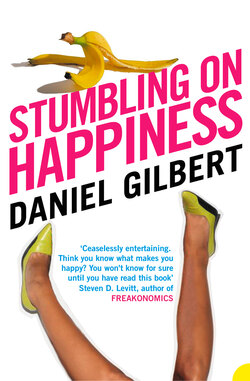Читать книгу Stumbling on Happiness - Daniel Gilbert - Страница 24
New Yeller
ОглавлениеIf we were to agree to reserve the word happiness to refer to that class of subjective emotional experiences that are vaguely described as enjoyable or pleasurable, and if we were to promise not to use that same word to indicate the morality of the actions one might take to induce those experiences or to indicate our judgments about the merits of those experiences, we might still wonder whether the happiness one gets from helping a little old lady across the street constitutes a different kind of emotional experience–bigger, better, deeper–than the happiness one gets from eating a slice of banana-cream pie. Perhaps the happiness one experiences as a result of good deeds feels different from that other sort. In fact, while we’re at it, we might as well wonder whether the happiness one gets from eating banana-cream pie feels different from the happiness one gets from eating coconut-cream pie. Or from eating a slice of this banana-cream pie rather than a slice of that one. How can we tell whether subjective emotional experiences are different or the same?
The truth is that we can’t–no more than we can tell whether the yellow experience we have when we look at a mustard jar is the same yellow experience that others have when they look at the same mustard jar. Philosophers have flung themselves headlong at this problem for quite some time with little more than bruises to show for it,20 because when all is said and done, the only way to measure precisely the similarity of two things is for the person who is doing the measuring to compare them side by side–that is, to experience them side by side. And outside of science fiction, no one can actually have another person’s experience. When we were children, our mothers taught us to call that looking-at-the-mustard-jar experience yellow, and being compliant little learners, we did as we were told. We were pleased when it later turned out that everyone else in the kindergarten claimed to experience yellow when they looked at a mustard jar too. But these shared labels may mask the fact that our actual experiences of yellow are quite different, which is why many people do not discover that they are colour-blind until late in life when an ophthalmologist notices that they do not make the distinctions that others seem to make. So while it seems rather unlikely that human beings have radically different experiences when they look at a mustard jar, when they hear a baby cry, or when they smell a former skunk, it is possible, and if you want to believe it, then you have every right and no one who values her time should try to reason with you.
